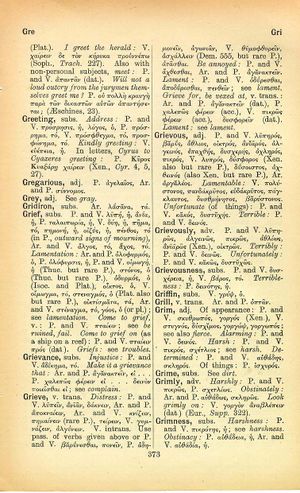grief
νεκρὸν ἐάν ποτ' ἴδηις καὶ μνήματα κωφὰ παράγηις κοινὸν ἔσοπτρον ὁρᾶις· ὁ θανὼν οὕτως προσεδόκα → whenever you see a body dead, or pass by silent tombs, you look into the mirror of all men's destiny: the dead man expected nothing else | if you ever see a corpse or walk by quiet graves, that's when you look into the mirror we all share: the dead expected this
English > Greek (Woodhouse)
subs.
P. and V. λυπή, ἡ, ἀνία, ἡ. P. ταλαιπωρία, ἡ, V. δύη, ἡ, πῆμα, τό, πημονή, ἡ, οἰζύς, ἡ, πένθος, τό (in P., outward signs of mourning), Ar. and V. ἄλγος, τό, ἄχος, τό. Lamentation: Ar. and P. ὀλοφυρμός, ὁ, P. ὀλόφυρσις, ἡ, P. and V. οἰμωγή, ἡ (Thuc. but rare P.), στόνος, ὁ (Thuc. but rare P.). ὀδυρμός, ὁ (Isoc. and Plat.), οἶκτος, ὁ, V. οἴμωγμα, τό, στεναγμός, ὁ (Plat. also but rare P.), οἰκτίσματα, τά, Ar. and V. στέναγμα, τό, γόος, ὁ (or pl.); see lamentation. Come to grief v.: P. and V. πταίειν; see be ruined, fail. Come to grief on (as a ship on a reef): P. and V. πταίειν πρός (dat). Griefs: see trouble.

